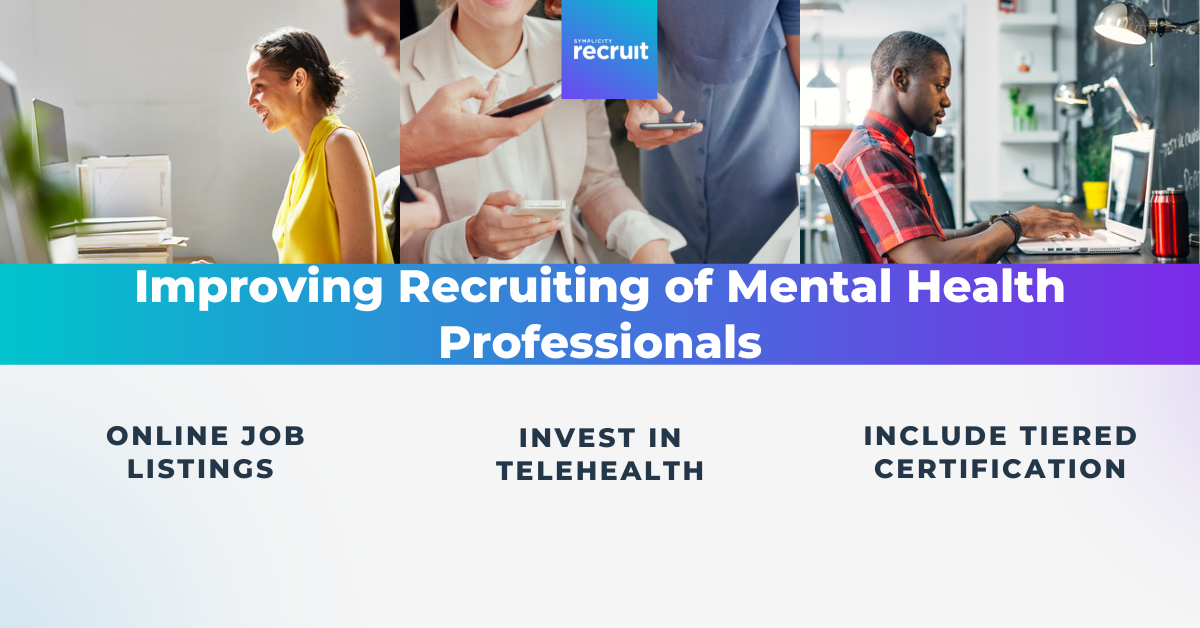In the United States, 64% of students drop out of college because of mental health issues on campus. While it’s true that there’s a stronger emphasis on promoting mental health on college campuses today with the U.S. surgeon general declaring mental health a “public health crisis” among 16-24 year olds declaring that mental health is a public health crisis, university behavioral health services are continuing to struggle to provide for students in crisis.
There’s a nationwide shortage of mental health professionals available and higher ed institutions can’t keep up with the demand for crisis interventions. Is there anything universities can do to improve recruiting of mental health providers?
Even before the pandemic, students seeking help from a university mental health therapist would have an average wait of a month before they were seen by a professional counselor. This is because a whopping 72% of mental health counselors go into the private sector, compared to 7% of counselors and therapists working in education.
Why Can't Colleges and Universities Hire More Counselors?
Lack of Federal Funding
Part of the workforce shortages and challenges have to do with policy. In order to support enough mental health providers, higher ed institutions need more funding from the federal government. Without enough funding, colleges and universities are not able to provide financial incentives or improve workplace conditions to accommodate more mental health therapists.
To support higher education institutions with this mental health crisis, Education Secretary Miguel Cardona and the American Council on Education are urging institutions to use Higher Education Emergency Relief Funding (HERF) on mental health services on campus. Utilizing this funding means that institutions can hire more mental health professionals to support their students. These funds, as the Department of Ed. Recommends can help “pay for staff or contractor work to coordinate, plan, or implement services that continue to support student, faculty, and staff mental health throughout the pandemic and beyond.
Lack of Pipeline/Pathway Programs
Many college-age students don’t realize the opportunities available to work in mental health services as a career. To combat this, some colleges and universities created programs to encourage students to consider behavioral health careers, like the University of Southern California’s Public Mental-Behavioral Pipeline Program or Loma Linda University’s Mental Health Pipeline Program.
Small Increase in Mental Health Graduates
According to a special report from Education Week data shows that while there’s still an active number of students going into psych programs, the increase of mental health professionals in the workforce is outpaced by the demand of students in crisis and the increasing enrollment of students every year.
How Can Colleges and Universities Improve Recruiting of Mental Health Professionals?

Highlight Unique Benefits in Job Listings
Health professionals new in their career may not be aware of the benefits offered by the state or your institution. Make sure to highlight anything different from the norm and focus on what’s in it for the student applicant.
- Does the state where your university is located offer special tax credits to providers practicing on campus?
*This varies by state. - Does your college or university offer loan repayment programs or scholarships to support careers in mental health services? Does the state where your institution is located allow license reciprocity?
*This varies by state.
Invest in Telehealth
With a growing need for mental health services for students on campuses, higher ed institutions have to find better ways to accommodate the high demand. One of the best ways to do this is to hire professionals that can treat students via telehealth.
Telehealth can:
- Mitigate the shortage of professionals by allowing counselors to provide services for students no matter where they are.
- Ease communication and provide a comfortable setting for students that want to keep their seeking for help private. Only 15% of college students seek help from counseling services; some students stay away due to a fear of being recognized when going to appointments.
- Provide results equal to (or sometimes better) than face-to-face services. Telehealth services offer a wide range of technological vehicles that make it an effective alternative when in-person services are not an option.
Include Tiered Certification
Because there’s a shortage of mental health professionals, something universities and colleges can do is to allow students enrolled in relevant programs to practice in the field earlier in their training. This is what’s called tiered certification–it’s a way for students to gain real-life experience with the help of clinical supervision. This type of training, not only encourages students to continue working for the same institution they’re getting a degree from, but it allows them to receive mentorship while they’re working on their degree.
About Symplicity
Symplicity empowers universities to create a more inclusive and engaging experience for students of all backgrounds by providing products that can support students holistically, both on campus and after graduation. With products like Symplicity Advocate, well-being advisors, and student services managers can identify students of concern or those that need additional support (long-term and short-term) and be directed to the right campus resources they need, even if counseling resources are limited. For universities looking to hire, Symplicity Recruit is used by hundreds of thousands to recruit new grads across industries including healthcare and education.
Schedule a conversation to learn more about Symplicity Advocate or Symplicity Recruit.